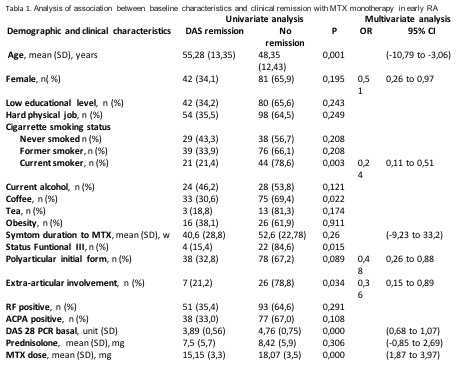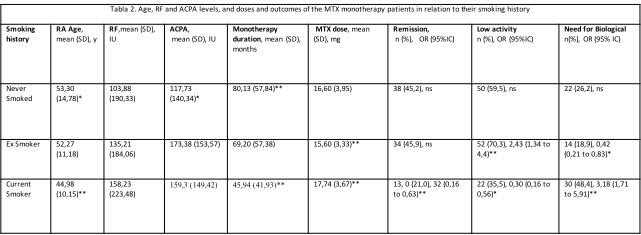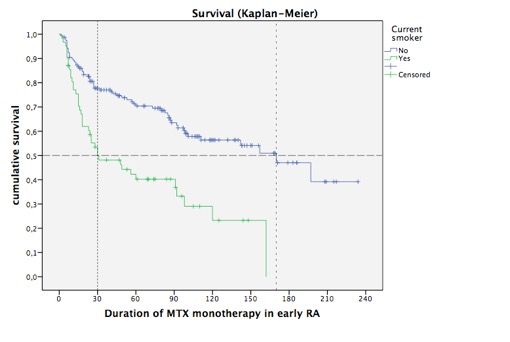Session Information
Date: Monday, November 14, 2016
Title: Rheumatoid Arthritis – Small Molecules, Biologics and Gene Therapy - Poster II
Session Type: ACR Poster Session B
Session Time: 9:00AM-11:00AM
Background/Purpose: The aim of early RA treatment is remission. Intensive treatment with MTX and treat-to-target approach achieve remission in 30-50% patients. Modifiable risk factors, as cigarette smoking and alcohol, coffee and tea intake, may affect response to MTX. The objective of this research was to study the influence of tobacco, alcohol, coffee and tea on the response to MTX in RA patients early DMARD-naive
Methods: We conducted a case-control study from 2010 to 2015, where cases were patients who achieved a sustained remission (DAS28PCR<2,6) or low activity (DAS28PCR<3,2) and controls were patients who not reached it. We collected information from a cohort of 182 Caucasian patients with early RA, aged 18-77 years, treated with MTX monotherapy from 1990 to 2015, evaluated quarterly in a specialized unit early RA. Clinical evaluations included DAS28CRP, HAQ, comorbiditIes, cardiovascular risk factors and pharmacovigilance data. All the patients underwent a structured interview about their smoking history and others habits. A descriptive study, comparison of means, univariate and multivariate correlations, logistic regression and survival analysis with SPSS statistics 21 was performed.
Results: Of the 182 patients achieved sutained remission 68 (37,4%) and low activity 99 (54,4%). Almost all patients (95 %) received MTX in rapid escalation (7,5-25mg) in the first 24 months of the onset of symptoms. Younger patients and current smokers responded worse to monotherapy and required higher doses of MTX. The univariate and multivariate analysis of the baseline patient characteristics and relationship of their smoking history with age, RF, ACPA and outcome of MTX monotherapy are shown in table 1 and 2, respectively. The median survival of MTX monotherapy (measure of efficacy, safety and tolerability) was 170 months for non-smokers and 30 months for current smokers (Log Rank 20,21, p 0,000) (see graphic).
Conclusion: The treatment of early RA with MTX alone achieved high rates of remission and low activity, especially in non-smokers. Smoking cessation could significantly improve the response to MTX and therefore should be an integral part of the treatment of early RA patients.
*p<0,05 **p<0,01
To cite this abstract in AMA style:
Chamizo Carmona E, Carrasco-Cubero C, Aznar Sánchez JJ, Veroz Gonzalez R, Rodriguez Araya TL, Cossio Jimenez PJ, Chaves Chaparro L. Influence of Modifiable Risk Factors on the Response to MTX Alone in Early RA Patients [abstract]. Arthritis Rheumatol. 2016; 68 (suppl 10). https://acrabstracts.org/abstract/influence-of-modifiable-risk-factors-on-the-response-to-mtx-alone-in-early-ra-patients/. Accessed .« Back to 2016 ACR/ARHP Annual Meeting
ACR Meeting Abstracts - https://acrabstracts.org/abstract/influence-of-modifiable-risk-factors-on-the-response-to-mtx-alone-in-early-ra-patients/



